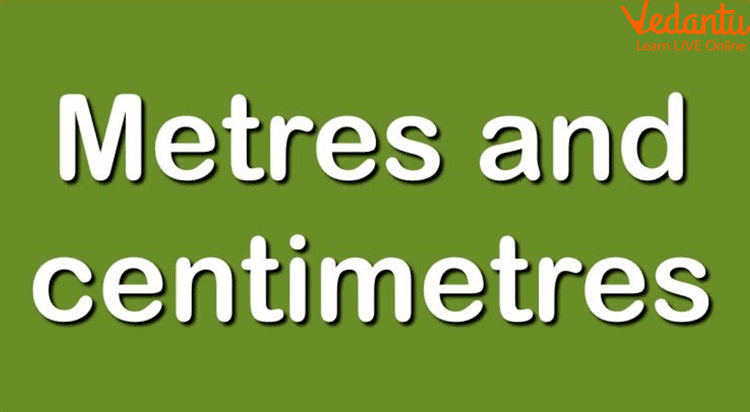




Step-by-Step Method to Change Centimeters into Meters
In Mathematics, we need to convert units while working on numerous problems. When performing calculations, certain transformations are required. For example, if a base is given in cm and height is given in meter, it's necessary to convert the measurement into centimetres. Here we will learn about this conversion and the cm to m formula.

Convertion of Units
Let's Learn about Conversion of Units
The use of a unit depends on the condition. The area of a room is expressed in metres, but the length of a pencil is expressed in centimetres and its consistency is in mm.

Metres and Centimetres
Centimetres to Metres Conversion
The centimeter to meter conversion (cm to m) is the evaluation of centimeters in meters. Centimeters are represented by cm, while meters are represented by m. Both centimetre and metre are used as units in the metric system to measure length or distance. According to the most advanced description, the size of the path travelled by light in a vacuum during a time interval with a span of 1/299 of a second is called the meter. Now, 100 centimetres equal one metre or one centimetre, similar to one-hundredth metre. Also, one centimetre is equal to 0.39370 elevations.

Using a Measuring Scale for Height Conversion
Why Should We Learn about Transformation?
A unit conversion is the expression of the same property in a different unit of measurement. To perform the necessary calculations, we need to convert one unit to another. For example, if we don't want to measure the length of a pencil in kilometres, we must convert kilometres (km) to centimetres. Generally, the conversion of one unit to another unit of the same volume is performed using multiplicative conversion factors. Let’s see how to convert a different team of length and mass.
How to Convert Metres to Centimetres?
The following is how the relationship between the metre and centimetre is expressed:
1 metre = 100 centimetre
You may also write it as
1 cm = 0.01 m.
How to Convert Centimetres to Metres?
One centimetre is roughly equal to 0.01 meter, or we can say that one meter equals 100 centimetres. Therefore, the relationship between centimetres to meter is given as centimetre = 0.01 meter
You can convert centimetres to metres by multiplying them by 0.01m. For example,
Q1. Convert 5 cm to 1 m
Ans: cm = 5 x 0.01 m
5 cm = 0.05 m
Hence, 5 cm is roughly equal to 0.05 m.
Conversion cm to m
Q2. Convert 75 cm to m.
Ans: We know that,
1 cm = 0.01 m
For converting 75 cm to m, multiply 75 cm by 0.01 m. We get
75 cm = 75 x 0.01 m
75 cm = 0.75 m
Thus, 75 cm is equal to 0.75 m.
Q3. Convert 210 centimetres to metres.
Ans: We know that,
1 cm = 0.01 m
Thus, 210 cm = 210 x 0.01
210 cm = 2.1 m
Therefore, 210 cm is equal to 2.1 m.
Summary
Centimetres (cm) and metres (m) are distance measures in the metric system. There are 100 centimetres in every meter, which means dividing your dimension by centimetres by 100 will convert it to standards. You can make this conversion quick and easy by moving the decimal point in your size two spaces (or “place values”) to the left-wing. Likewise, if you need to convert from metres to centimetres instead, move the decimal point 2 spaces to the right!
FAQs on Quick Guide: Convert Centimeters to Meters
1. What is the basic formula to convert centimetres to metres?
To convert a measurement from centimetres (cm) to metres (m), you divide the number of centimetres by 100. The simple formula is: Metres = Centimetres ÷ 100. This is because there are exactly 100 centimetres in one metre.
2. How many centimetres are there in one metre?
There are exactly 100 centimetres (cm) in 1 metre (m). This is the fundamental relationship in the metric system that is used for all conversions between these two units of length. So, 1 m = 100 cm.
3. Can you explain how to convert 20 cm into metres with an example?
Certainly. To convert 20 cm into metres, we apply the standard conversion formula: Metres = Centimetres ÷ 100.
- Step 1: Take the value in centimetres, which is 20.
- Step 2: Divide this value by 100. So, 20 ÷ 100 = 0.20.
Therefore, 20 centimetres is equal to 0.20 metres.
4. How do you convert metres back into centimetres?
To convert a measurement from metres (m) back into centimetres (cm), you perform the reverse operation: you multiply the number of metres by 100. The formula is: Centimetres = Metres × 100. For example, 2.5 metres would be 2.5 × 100 = 250 centimetres.
5. What is the easiest way to remember the cm to m conversion?
A simple trick is to think about moving the decimal point. To convert from centimetres to metres, you are going from a smaller unit to a bigger unit, so the number gets smaller. You move the decimal point two places to the left (dividing by 100). For example, 150.0 cm becomes 1.50 m. To go from metres to centimetres, you move the decimal point two places to the right.
6. How does converting cm to m for length differ from converting cm² to m² for area?
The conversion factor changes significantly for area. While 1 m = 100 cm for length, area involves two dimensions (length × width). The relationship is:
- 1 m² = 1 m × 1 m
- 1 m² = 100 cm × 100 cm = 10,000 cm²
Therefore, to convert from cm² to m², you must divide by 10,000, not 100. This is a common point of confusion in mensuration topics within the NCERT syllabus.
7. Why do we need to divide by 100 to convert cm to m?
We divide by 100 because the metre is the larger, base unit of length, while a centimetre is a smaller unit. The prefix "centi-" in the metric system means one-hundredth. This signifies that 1 centimetre is defined as 1/100th of a metre. To determine how many full metres are contained within a given number of centimetres, you must perform this division.
8. Where would I use cm to m conversion in real-life examples?
This conversion is very common in everyday life. Some practical examples include:
- Measuring Height: A person's height is often measured in centimetres (e.g., 175 cm) and then converted to metres (1.75 m) for general use.
- Home and Furniture: When planning a room, you might measure wall space in metres (e.g., a 4 m wall), but the dimensions of furniture like a table or sofa are often given in centimetres.
- School Projects and Crafts: Science projects or art activities may require materials measured in metres, but the actual work involves precise cuts and measurements in centimetres.
9. How does the cm to m conversion relate to other metric units like millimetres (mm)?
The metric system is logically structured around powers of 10, making all conversions related. The hierarchy is:
- 1 metre (m) = 100 centimetres (cm)
- 1 centimetre (cm) = 10 millimetres (mm)
From this relationship, we can deduce that 1 metre = 100 cm × 10 mm/cm = 1000 millimetres (mm). Understanding this structure is a core concept in the CBSE curriculum for Classes 4 and 5.























